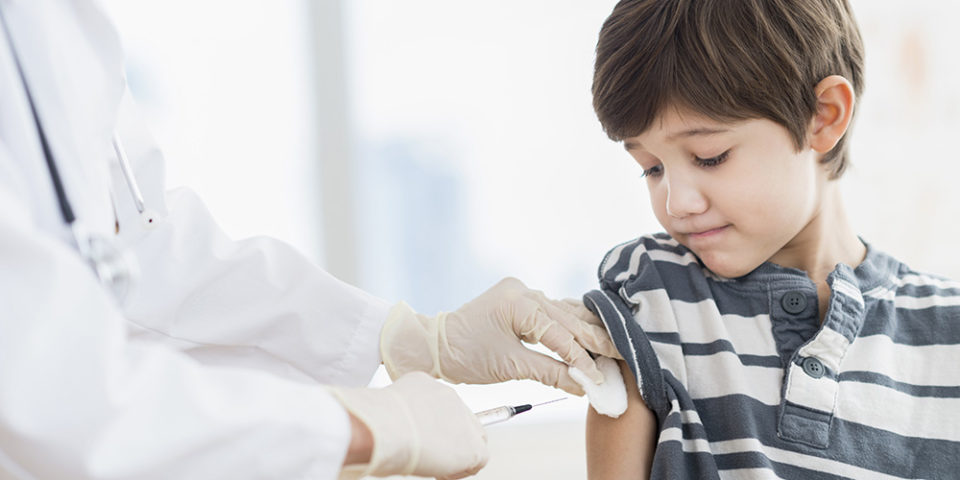The importance of vaccines for children – from birth to teens
Newborn babies, infants and children are still developing their immune systems, and vaccines can give them a boost in immunity that protects them from severe illness or even hospitalization for years to come. Pediatrician Madison Merritt, MD, shared what you need to know regarding your child’s vaccinations, from birth to their pre-college years.
When does my child need to be immunized?
Your child’s immunizations should begin at birth. “We recommend the hepatitis B vaccine before they leave the hospital. This vaccine prevents against the development of hepatitis, a chronic liver infection. This shot is recommended at birth because babies can get this during the delivery from mom, who may not be aware she has contracted the virus,” said Dr. Merritt. Babies who contract this virus at birth have a high likelihood of becoming chronically infected without the vaccine.
What vaccines should children get?
Your child should get all vaccines recommended by the Centers for Disease Control and Prevention (CDC) and your pediatrician. The first set of vaccines are recommended in the first 6 months of life. “We start with the hepatitis B vaccine given at birth, then continue other vaccines and booster shots at 2, 4, and 6 months of life,” said Dr. Merritt. These early vaccines protect against:
- Hepatitis B
- Rotavirus
- Tetanus
- Diphtheria
- Polio
- Pertussis
- Haemophilus influenzae type b (Hib)
- Pneumococcal bacteria
Starting at 12 months, we recommend vaccines against:
- Measles
- Mumps
- Rubella
- Varicella (chicken pox)
- Hepatitis A
Starting at 11 years of age, both the meningitis vaccine and the human papillomavirus (HPV) vaccine are recommended. The meningitis vaccine protects against common bacteria that can infect the fluid around the spinal cord and brain and lead to very serious long term complications. The HPV vaccine protects against the most common strands of the human papilloma virus, which is the virus associated with most cases of cervical cancer. “This is literally a vaccine that can prevent cancer,” said Dr. Merritt.
Yearly flu vaccines are also recommended for all children over the age of 6 months.
“There are special circumstances and conditions for which your child may need a vaccine at a different time than recommended or may not be able to receive a certain vaccine during a certain timeframe. These instances are rare and should be discussed with your pediatrician,” said Dr. Merritt.
Why are these vaccines necessary?
Bacteria and viruses can cause a range of health issues in children, from common ear infections to more severe illnesses such as pneumonia, dehydration, blood infections and meningitis.
“Many of these illnesses are severe enough to lead to hospitalization and some have long-term medical complications that are prevented by getting the vaccines. Sometimes people who carry these bacteria or viruses are not aware of them, so even if you’re careful about keeping your child away from people who may be sick, they could still come in contact with one of these bacteria or viruses,” said Dr. Merritt.
Are specific shots needed for college students?
Colleges usually require an up-to-date tetanus (TDAP) vaccine as well as the meningitis vaccine, as college campuses and group living environments are high risk areas for meningitis-causing bacteria to spread.
Should children get the COVID-19 vaccine?
“At this time, we are strongly encouraging those old enough to receive the vaccine to do so,” said Dr. Merritt.
How can I prepare my child for a shot so they aren’t scared?
As the parent, you know your child best. Some children need extra time to prepare for a shot, so knowing ahead of time that they will be getting vaccines can be helpful. Other children may get more anxious or afraid the longer they have to worry about the shot. For those kids, it’s sometimes more helpful to let them know once they’re here for the visit, so they don’t have time to become overly stressed out about it. There are many more tips parents can use to make the process easier.
“The most important thing is to be reassuring and present for your child. Help support both your child and the person giving the vaccine. The more stressed a parent is about vaccines, the more stressed a child will become, so keep your attitude in mind as well,” said Dr. Merritt.
If my child has a reaction to a shot, what should I do?
It is not abnormal for your child to have a reaction after a vaccine. “When we give a vaccine to a child, we are telling the child’s body that this is something to recognize and fight against the next time they encounter it. A low-grade fever, redness or swelling at the injection site are all good signs that the body has started to build up a response to the vaccine and the bacteria or virus we want to protect the child from,” said Dr. Merritt.
If a child develops a fever after a vaccine, it is okay to give them a dose of Tylenol or Motrin (if over 6 months old). It is not recommended that you use these medications prior to vaccine administration. You will want to wait to see if a fever develops before offering treatment. If a child has some redness or swelling at the site of a vaccine, usually a thigh or upper arm, apply an ice pack to the area and give them Tylenol or Motrin for pain. Be sure to call your doctor or take your child to the emergency room if a severe reaction occurs such as hives or respiratory distress following a vaccine.
Find the care you need, close to home
Our primary care physicians provide well visits and everyday care when you need it with compassion and expertise.
Find Primary Care Near You

